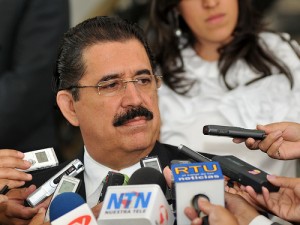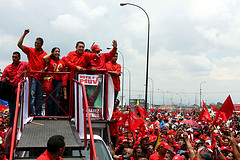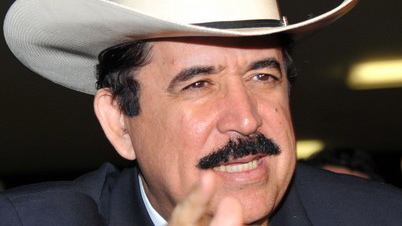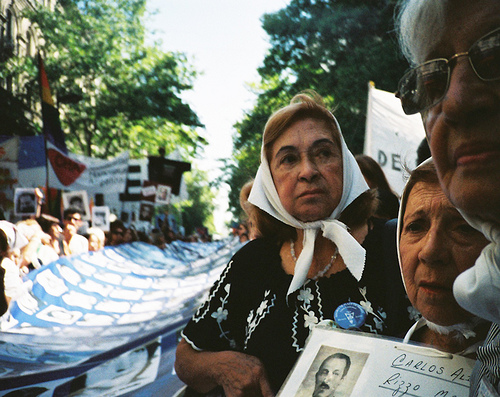
Honduras, Latin America: Week in Review
Ousted President Manuel Zelaya May Return To Honduras
May 12, 2011 By Staff
Today in Latin America
Top Story — Ousted Honduran President Manuel Zelaya may iron out an agreement to return to his home country within a matter of weeks, his aide Rasel Tomé said Wednesday.
“The day and hour that he will return has not been determined, but we will announce it publicly so that a massive number of people can welcome him at the airport,” said Juan Barahona of the pro-Zelaya National Popular Resistance Front.
The Honduran military removed Zelaya from power in June 2009 and sent him into exile. After a brief attempt to return to Honduras and retake the presidency, Zelaya accepted defeat and left for the Dominican Republic, where he currently lives.
The Honduran Supreme Court recently dropped corruption charges against the former president, making his return more likely. Zelaya’s aide Tomé said, however, that some issues remained unresolved. “First, the powers that be in Honduras need to agree to the setting up of a constituent assembly… and recognize the political movement in support of President Zelaya as a legitimate political party,” Tomé told the BBC.
Zelaya’s return would facilitate Honduras’ return to the Organization of American States (OAS).
The OAS suspended Honduras because of the coup in July 2009. After the interim government held elections in November 2009, bringing in the current Porfirio Lobo administration, the United States, Colombia and other countries recognized the new government. Secretary of State Hillary Clinton said at a conference in Washington Wednesday that the United States wanted to restore Honduras’ membership to the OAS.
But other countries in the Western Hemisphere, including Brazil, Venezuela and Argentina, say they want to see Zelaya return to Honduras before they’ll vote to let the country back into the OAS.
In related news, unknown assassins murdered Honduran television journalist Héctor Francisco Medina Polanco. Medina was shot while riding his motorcycle home from work on Tuesday and died Wednesday in a hospital in the town of San Pedro Sula.
Honduras has become one of the most dangerous countries in the world for journalists in recent years. Nine other journalists have been murdered since March 2010, according to the Committee to Protect Journalists.
Just Published at the Latin America News Dispatch
- With 10 journalists murdered since 2008, Honduras is one of the most dangerous countries in the world to report. Andrew O’Reilly explains why violence there is soaring in “Who’s Killing the Journalists of Honduras?”
Headlines from the Western Hemisphere
North America
- U.S. Senate Democrats Wednesday reintroduced the proposed Dream Act, a piece of legislation that would give children brought to the U.S. illegally a route to citizenship if they pursue a college education or military service.
- Transparencia Mexicana released a report Wednesday that said corruption in Mexico is on the rise.
- Mexican soldiers found eight more bodies in mass graves in the northern state of Durango, bringing the total number of victims there to 188.
- Mexico’s economic growth rate could approach 5 percent this year, according to President Felipe Calderón at a conference organized by the Council of the Americas.
Caribbean
- A Cuban baseball player, who defected last August, is set to make his minor-league debut Thursday and could join the Texas Rangers this season.
- House Republicans told the top U.S. foreign aid official Wednesday that his agency’s earthquake relief efforts in Haiti have been a failure.
Central America
- A Guatemalan judge Tuesday dropped charges against a former prison director accused of participating in the killings of ten inmates.
- Six alleged drug traffickers were killed and two police officers and a teenager injured in a three-hour gunbattle in a rural province in eastern Honduras.
Andes
- Venezuela’s largest oil refinery is back to being fully operational after an air system failure shutdown multiple units late last week.
- Ecuador’s government accused the National Electoral Council of manipulating the vote count of Saturday’s controversial referendum to make it appear as if it was losing two of the 10 issues.
Southern Cone
- Chilean President Sebastían Piñera defended the decision of a Chilean environmental panel to approve a permit for the construction of a controversial hydroelectric project in Aysen, Chile.
- Argentine artist Marta Minujín created an 82-foot tower made of books after Buenos Aires was named 2011 World Book Capital by the United Nations Educational, Scientific and Cultural Organization (UNESCO).
- A ten year-old Bolivian boy accidentally arrived in Chile after hitching a ride underneath a transport truck that he thought would take him to his mother in Cochabamba, Bolivia.
Image:Presidencia de la República del Ecuador @ Flickr.






